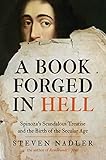A Book Forged in Hell : Spinoza's Scandalous Treatise and the Birth of the Secular Age / Steven Nadler.
Material type: TextPublisher: Princeton, NJ : Princeton University Press, [2011]Copyright date: ©2011Description: 1 online resource (304 p.) : 1 halftoneContent type:
TextPublisher: Princeton, NJ : Princeton University Press, [2011]Copyright date: ©2011Description: 1 online resource (304 p.) : 1 halftoneContent type: - 9780691160184
- 9781400839513
- 199.492
- B3985.Z7 N34 2011eb
- online - DeGruyter
- Issued also in print.
| Item type | Current library | Call number | URL | Status | Notes | Barcode | |
|---|---|---|---|---|---|---|---|
 eBook
eBook
|
Biblioteca "Angelicum" Pont. Univ. S.Tommaso d'Aquino Nuvola online | online - DeGruyter (Browse shelf(Opens below)) | Online access | Not for loan (Accesso limitato) | Accesso per gli utenti autorizzati / Access for authorized users | (dgr)9781400839513 |
Browsing Biblioteca "Angelicum" Pont. Univ. S.Tommaso d'Aquino shelves, Shelving location: Nuvola online Close shelf browser (Hides shelf browser)

|

|

|

|

|

|

|
||
| online - DeGruyter The Concise Princeton Encyclopedia of American Political History / | online - DeGruyter All the Missing Souls : A Personal History of the War Crimes Tribunals / | online - DeGruyter The Virtues of Our Vices : A Modest Defense of Gossip, Rudeness, and Other Bad Habits / | online - DeGruyter A Book Forged in Hell : Spinoza's Scandalous Treatise and the Birth of the Secular Age / | online - DeGruyter Roosevelt's Lost Alliances : How Personal Politics Helped Start the Cold War / | online - DeGruyter Lost Colony : The Untold Story of China's First Great Victory over the West / | online - DeGruyter Uneducated Guesses : Using Evidence to Uncover Misguided Education Policies / |
Frontmatter -- Contents -- Preface -- Acknowledgments -- Chapter 1. Prologue -- Chapter 2. The Theological-Political Problem -- Chapter 3. Rasphuis -- Chapter 4. Gods and Prophets -- Chapter 5. Miracles -- Chapter 6. Scripture -- Chapter 7. Judaism, Christianity, and True Religion -- Chapter 8. Faith, Reason, and the State -- Chapter 9. Libertas philosophandi -- Chapter 10. The Onslaught -- A Note on Texts and Translations -- Abbreviations -- Notes -- Bibliography -- Index
restricted access online access with authorization star
http://purl.org/coar/access_right/c_16ec
When it appeared in 1670, Baruch Spinoza's Theological-Political Treatise was denounced as the most dangerous book ever published--"godless," "full of abominations," "a book forged in hell . . . by the devil himself." Religious and secular authorities saw it as a threat to faith, social and political harmony, and everyday morality, and its author was almost universally regarded as a religious subversive and political radical who sought to spread atheism throughout Europe. Yet Spinoza's book has contributed as much as the Declaration of Independence or Thomas Paine's Common Sense to modern liberal, secular, and democratic thinking. In A Book Forged in Hell, Steven Nadler tells the fascinating story of this extraordinary book: its radical claims and their background in the philosophical, religious, and political tensions of the Dutch Golden Age, as well as the vitriolic reaction these ideas inspired. It is not hard to see why Spinoza's Treatise was so important or so controversial, or why the uproar it caused is one of the most significant events in European intellectual history. In the book, Spinoza became the first to argue that the Bible is not literally the word of God but rather a work of human literature; that true religion has nothing to do with theology, liturgical ceremonies, or sectarian dogma; and that religious authorities should have no role in governing a modern state. He also denied the reality of miracles and divine providence, reinterpreted the nature of prophecy, and made an eloquent plea for toleration and democracy. A vivid story of incendiary ideas and vicious backlash, A Book Forged in Hell will interest anyone who is curious about the origin of some of our most cherished modern beliefs.
Issued also in print.
Mode of access: Internet via World Wide Web.
In English.
Description based on online resource; title from PDF title page (publisher's Web site, viewed 29. Jul 2021)


